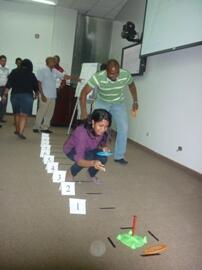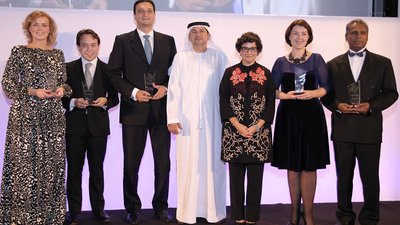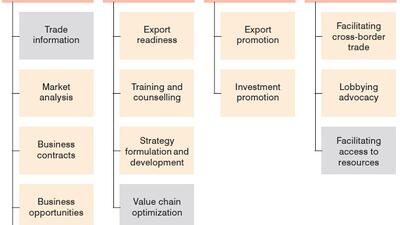Empretec: inspiring entrepreneurship
As the world faces congruent social, economic and environmental challenges, there is an ever present need for creativity, technology and innovation in order to bring new ideas to market that will support social and economic transformation. Entrepreneurship enhances productivity growth and can help find practical business solutions to social and environmental challenges. It also has the potential to contribute to specific sustainable development objectives, such as the employment of women, young people or disadvantaged groups. In this way, entrepreneurship contributes to the reduction of economic and social inequality, as well as to the income gap that persists in many countries.
The most effective entrepreneurship development programmes are part of a holistic and coherent policy framework that takes into account the complementary roles of the government, private sector and donor community. Policymakers are looking to adopt a comprehensive policy approach, but many developing countries encounter challenges in designing and implementing entrepreneurship policies in a coherent and coordinated manner.
In response to this, the United Nations Conference on Trade and Development (UNCTAD) has developed an Entrepreneurship Policy Framework and Implementation Guidance that aims to support developing country policymakers and those from economies in transition in the design of initiatives, measures and institutions to promote entrepreneurship. The framework outlines key policy areas that have a direct impact on entrepreneurial activity:
- Formulating a national entrepreneurship policy
- Optimizing the regulatory environment
- Enhancing entrepreneurship education and skills development
- Facilitating technology exchange and innovation
- Improving access to finance
- Promoting awareness and networking
Of course, national entrepreneurship strategies need to be tailored to each country’s specific conditions and the most appropriate policy packages depend on the existing level of entrepreneurship and the structural characteristics of a country.
Pre-conditions for any programme fostering entrepreneurship are the existence of sound macroeconomic conditions, enabling business environments and positive investment climates. Rule of law and good governance are often constraints in developing countries and the extent of these problems is highlighted in the World Bank’s Doing Business 2013 report. According to the report, businesses in developing countries face three times the regulatory burden that businesses in developed countries experience. As a result, several governments from developing countries are taking action. The report notes 201 regulatory reforms during 2011 and 2012 making it easier to do business in 108 economies. Nine economies, including Burundi, Costa Rica, Greece, Kazakhstan, Mongolia, Serbia, Sri Lanka, Ukraine and Uzbekistan, improved the most across several areas of regulation measured by the report. Globally, reform efforts have focused on making it easier to start a new business, increasing the efficiency of tax administration and facilitating trade across international borders. Of the 201 regulatory reforms recorded in the World Bank report, 44% focused on these three policy areas.
In an enabling environment, successful entrepreneurship also requires ideas, opportunities, and ‘entrepreneurial spirits’. In developing nations, there are often several individuals who embody these characteristics but lack the knowledge to pursue their business ideas. One of the pioneering programmes in the United Nations effort to develop entrepreneurship is Empretec, a programme that instils behavioural change into a select group of promising entrepreneurs. The programme started in 1988 in partnership with the United Nations Development Programme. Under the leadership of UNCTAD and its public and private partners and donors, including the governments of Italy, Germany, Spain and the Netherlands, the Empretec programme has engaged more than 600 local certified trainers to train over 300,000 entrepreneurs in
34 developing countries and economies in transition.
Empretec provides a one-stop-shop for information and business training. By stimulating public-private sector partnerships and developing institutions with forward-looking advisory boards, Empretec plays a major role in connecting entrepreneurs with institutions. Wherever they are implemented, the training workshops create lifelong bonds that are essential to future business growth as they form a critical mass of successful, committed entrepreneurs who become the driving force of the project.
The Empretec behavioural approachEmpretec places a lot of emphasis on the identification, selection and recruitment of workshop participants. This is done through a combination of pre-screening tests, a behaviour-focused interview and a business-related interview. The Empretec Training Workshop comprises modules focusing on the 10 personal entrepreneurial competencies noted in 1987 by David McClelland in the Journal of Creative Behavior. The curriculum includes experiential learning delivered by interactive teaching methods that incorporate practical experience and encourage learning by doing in contrast to more traditional forms of academic learning.
McClelland developed the Empretec methodology at Harvard University, basing it on research findings that everyone has an inner motivation to improve. This ‘motive for action’ is divided into three motivational categories: achievement, affiliation and power. The 10 personal entrepreneurial competencies that form the basis of the Empretec Training Workshop are:
1. Opportunity seeking and initiative
Entrepreneurs seek opportunities and take the initiative to transform them into business situations.
2. Persistence
When most people tend to abandon an activity, successful entrepreneurs stick with it.
3. Fulfilling commitments
Entrepreneurs keep their promises no matter how great the personal sacrifice.
4. Quality and efficiency
Entrepreneurs try to do something better, faster or cheaper.
5. Calculated risk taking
Taking calculated risks is one of the primary concepts in entrepreneurship.
6. Goal setting
This is the most important competency because none of the rest will function without it. Entrepreneurs set goals and objectives that are meaningful and challenging.
7. Information seeking
Entrepreneurs gather information about their clients, suppliers, technologies and opportunities.
8. Systematic planning and monitoring
Systematic behaviour means acting in a logical way. Planning is deciding what to do and monitoring means checking.
9.Persuasion and networking
Entrepreneurs influence other people to
follow them or do something for them.
10. Independence and self-confidence
Entrepreneurs have a quiet self-assurance in their capability or potential to do something.
Brazil is the leading light of the Empretec programme. Since inception, it has been a laboratory of innovation. The programme operates in 27 Brazilian states thanks to a partnership agreement with SEBRAE, the national agency for small- and medium-sized enterprise development. In Brazil, new training materials and product upgrades are kicked off and tested before they are replicated in other countries. Brazil also boasts the largest number of certified national trainers and international master trainers working within the Empretec programme. More than half of the more than 300,000 people trained around the world are in Brazil – some 185,000.
SEBRAE recently conducted an evaluation of Empretec in Brazil. This confirmed that half of the participants who attended Empretec training with no previous experience in business became entrepreneurs. In a separate survey, also by SEBRAE, 73% of entrepreneurs that had already established businesses registered sales expansion. In this sample, 79% improved their profits and 62% employed more people after the training workshop than before.
A Brazilian success story
Vanessa Vilela Araujo is the founder of Kapeh, an innovative cosmetics brand that uses certified coffee extract as the core of its products. Kapeh is located in Southern Minas Gerais, a region with a tradition in the cultivation of quality coffees. Araujo was nominated for the 2010 Empretec Women in Business Award, which motivated her to market Kapeh beyond Brazil’s borders.
In addition to acquiring UTZ Certified Good Inside certification for her innovative cosmetics, Araujo recently received the certifications needed to export to Portugal and the Netherlands, and now aims to export her products to the entire European Union. Her vision is 'to make Kapeh a company with global presence and a reference in terms of innovation and quality in the cosmetics field'.
Araujo’s efforts have been rewarded. In August 2011, Kapeh won the National Innovation Award from Brazil’s Confederation of Industry, the Competitive Brazil Movement and the Brazilian Ministry of Science, Technology and Innovation. She says: 'The Empretec award nomination has had a profound impact on the way I look at our business and the stakeholders we are held accountable to. The award nomination was the highlight of the learning process I went through during Empretec training, and it was by means of the constant mentoring given by the programme that I was able to carry my business plans forward to create a viable and expanding operation. A welcome side effect is increased attention that has substantially raised demand for our products, so much so that we doubled both our sales revenue and net income in 2012.' Kapeh, which started with one employee in 2007, today has a staff of 10 and provides income for more than 150 farmers and harvesters.










